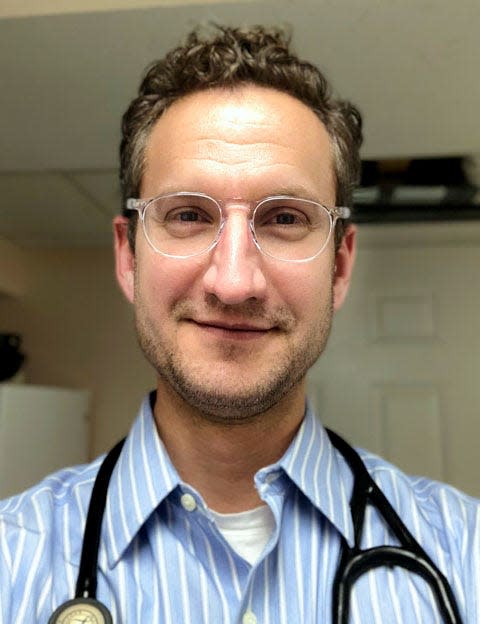Caring for kids during COVID and beyond: Always know your favorite dinosaur and princess
A few days ago, I had an online appointment with a patient. Because I’m a pediatrician, my patient was a young boy. As I was wrapping things up, I concluded as I usually do, by asking whether there was anything more they would like to discuss. The boy smiled in the way small children sometimes do when they’re feeling shy, and whispered something to his mother. She smiled, too, and told me he wanted to talk about dinosaurs.
We ended the appointment a few minutes later, with a promise to talk about dinosaurs more soon, and I hopped onto Twitter to mention that sweet little interaction. Moments like that are why I think pediatrics is the best specialty to practice. Then I went back to my day.
When I checked sometime later, I saw that the tweet had started to get some attention. People were liking and sharing it at a pretty good clip. A sweet little boy wanting to talk to his doctor about dinosaurs, the most natural thing in the world at that age, was something that makes a day brighter.
Good afternoon to everyone, but especially to the 5-year-old who wanted to extend his telehealth visit with me to talk about dinosaurs.
— Daniel Summers, MD 🏳️🌈 (@WFKARS) June 16, 2021
A few hours later, I added a tweet noting that being conversant in certain topics is of great importance as a pediatrician. Weighty matters are often discussed during appointments, and it’s necessary to be prepared if your patient wants to know your favorite dinosaur. Or superhero. Or bug or animal. (Triceratops, Storm, dragonfly and tiger for me, respectively.)
And how are you to be a credible authority if you can’t identify your favorite princess (tie between Rapunzel in "Tangled" and Moana in, well, "Moana") and support the reasons for your choice when asked?

The joy of childhood is contagious. As of Sunday afternoon, my initial tweet had been shared nearly 5,500 times and been liked by more than 150,000 people. It’s likely to be my most popular tweet of the year.
Fascinated with what delights them
A truism in pediatrics is that children are not little adults. Childhood is not merely a process of growing up. It is a wonderful time of life all on its own. One of the things that makes kids a joy to work with is their unapologetic fascination with what delights them. If you have a chance to talk about dinosaurs, why pass it up?

As we have endured the pandemic, being a doctor for children has given me a perspective that has shifted over time.
When it became clear relatively early that COVID-19 is an illness most dangerous for older people, there was comfort in being able to offer some reassurance to worried parents. In contrast to my colleagues in specialties like emergency medicine or critical care, I didn’t have to care for grievously ill patients of my own. (This does not mean some children have not become very ill or died, and is not a reason to wave away precautions.)
Family time: In our two-surgeon family, COVID changed everything. Here are the lessons I'm taking with me.
In the months that followed, I have seen how my patients have done their best to thrive without being in schools, without sports and graduations and birthday parties. I have heard from parents about the challenges of juggling jobs, keeping their kids on task in Zoom classrooms and meeting the everyday needs of existence. I have done my best to address the struggles with mental health that have emerged for so many of my patients.
It has been so hard for many of them, as it has been so hard for so many of the rest of us.
Young patients still awaiting vaccines
And now, we find ourselves with the pandemic finally receding in our country, at least in places where sufficient numbers of people have taken the step of getting vaccinated. More and more of us are able to safely return to the things we love, which have been so painfully absent. It feels so good to have arrived here at last.
But not for many of my patients. Not all the way, not yet.

Every time I check the vaccination record of a patient who is 12 or older, and see the dates of their COVID-19 vaccines, it has made me happy. It hasn’t gotten old yet, and I doubt it ever will. I ask them all about the things they are looking forward to doing again.
Only adults can protect kids: To defeat COVID-19, remember the children and don't let down your guard
For my patients who are younger than that, it is still a waiting game. I offer hopeful timelines for when a vaccine might be approved in the months to come, but no certainty. I talk about the things that are safe to do, and things that aren’t truly safe for them yet. Things are a lot better in a lot of ways, but not all the way.
And so, as they wait, children still make their way to joy where they can find it. That’s just how kids are. And I’m here to talk about what makes triceratops so cool.
Dr. Daniel Summers is a pediatrician in North Andover, Massachusetts. Follow him on Twitter: @WFKARS
You can read diverse opinions from our Board of Contributors and other writers on the Opinion front page, on Twitter @usatodayopinion and in our daily Opinion newsletter. To respond to a column, submit a comment to letters@usatoday.com.
This article originally appeared on USA TODAY: Awaiting vaccines, talking dinosaurs: Pediatrician's job during COVID

 Yahoo Movies
Yahoo Movies 
